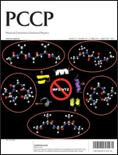
PHYSICAL CHEMISTRY CHEMICAL PHYSICS
Scope & Guideline
Unlocking the Mysteries of Matter and Energy
Introduction
Aims and Scopes
- Physical Chemistry:
Research exploring the fundamental principles of physical chemistry, including thermodynamics, kinetics, and quantum chemistry. - Chemical Physics:
Studies that investigate the physical properties and behaviors of chemical systems, often using advanced computational methods and experimental techniques. - Nanotechnology and Materials Science:
Papers discussing the synthesis, characterization, and application of nanomaterials, including their optical, electronic, and catalytic properties. - Spectroscopy and Analytical Techniques:
Research utilizing spectroscopic methods to investigate molecular structures, dynamics, and interactions at the atomic and molecular levels. - Electrochemistry:
Studies focused on electrochemical processes, including battery technology, fuel cells, and electrocatalysis. - Surface Chemistry:
Research involving chemical reactions and interactions that occur at surfaces and interfaces, including catalysis and adsorption phenomena. - Quantum Dynamics and Molecular Modeling:
Papers that employ quantum mechanical models to understand complex molecular systems and their dynamics.
Trending and Emerging
- Machine Learning and Artificial Intelligence in Chemistry:
An increasing number of studies are leveraging machine learning techniques for predicting molecular properties, optimizing reactions, and enhancing computational efficiency. - Sustainable Chemistry and Green Technologies:
Research focusing on environmentally friendly processes, including CO2 reduction, renewable energy materials, and sustainable synthesis methods is becoming more prominent. - Two-Dimensional Materials:
Significant interest in the properties and applications of two-dimensional materials, such as graphene and transition metal dichalcogenides, is evident in recent publications. - Electrocatalysis and Energy Storage:
Research into new electrocatalytic materials and battery technologies, particularly for lithium-ion and sodium-ion batteries, is trending strongly. - Biophysical Chemistry:
Studies at the interface of chemistry and biology, exploring molecular interactions in biological systems and their implications for drug design and development, are gaining attention. - Photoactive Materials and Photocatalysis:
There is a noticeable increase in research on materials designed for photocatalytic applications, particularly in energy conversion and environmental remediation.
Declining or Waning
- Traditional Coordination Chemistry:
Research focusing on classical coordination compounds has decreased as newer materials and methods gain prominence. - Basic Organic Chemistry:
Studies centered on fundamental organic reactions without a significant physical chemistry perspective are less prevalent compared to more integrated approaches. - Inorganic Solid-State Chemistry:
Research on conventional inorganic materials and their structures has waned, possibly overshadowed by advances in nanomaterials and hybrid systems.
Similar Journals
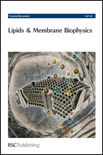
FARADAY DISCUSSIONS
Exploring the Frontiers of Theoretical and Physical ChemistryFARADAY DISCUSSIONS, published by the prestigious Royal Society of Chemistry, serves as a premier platform for scholarly discourse in the realms of both Physical and Theoretical Chemistry and Medicine. With its ISSN 1359-6640 and E-ISSN 1364-5498, this journal has a rich history dating back to 1947, evolving through significant periods of scientific advancement, with engaging discussions scheduled through to 2024. Recognized for its impact, FARADAY DISCUSSIONS ranks in the Q1 category for Physical and Theoretical Chemistry and Q2 for miscellaneous Medicine in 2023, affirming its role in pioneering research and innovative thought leadership. Researchers and professionals alike benefit from this journal’s commitment to open, critical dialogue on current trends and breakthroughs in chemistry, making it an essential resource for anyone looking to stay at the forefront of these dynamic fields.
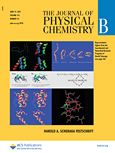
JOURNAL OF PHYSICAL CHEMISTRY B
Exploring Interdisciplinary Applications of ChemistryJournal of Physical Chemistry B, published by the American Chemical Society, is a leading international platform dedicated to advancing our understanding of physical chemistry and its applications in various interdisciplinary fields. With an impressive 2023 Impact Factor, and categorized in Q1 for Physical and Theoretical Chemistry as well as Surfaces, Coatings and Films, this journal showcases cutting-edge research that contributes significantly to materials science, supporting the innovative development of new materials and technologies. The journal, established in 1997 and converging its years of publication to 2024, maintains rigorous peer-review standards and is accessible to a global audience, enabling the dissemination of pivotal research findings. Moreover, it is renowned for its comprehensive coverage in the realms of materials chemistry and miscellaneous medical applications, making it a vital resource for researchers, professionals, and students alike in their pursuit of excellence in scientific inquiry.
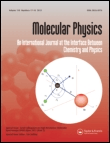
MOLECULAR PHYSICS
Fostering collaboration in cutting-edge molecular research.MOLECULAR PHYSICS, published by Taylor & Francis Ltd, is a distinguished international journal that has been advancing the fields of biophysics, condensed matter physics, molecular biology, and physical and theoretical chemistry since its inception in 1958. With an ISSN of 0026-8976 and an E-ISSN of 1362-3028, the journal provides a rich platform for the dissemination of high-quality research, evidenced by its Q3 ranking in several domains including both biophysics and condensed matter physics as of 2023. Although the journal operates on a traditional subscription model rather than an Open Access basis, its rigorous selection process ensures the publication of relevant and impactful articles. The journal's continued convergence of research until 2024 underlines its ongoing significance and adaptability in an ever-evolving scientific landscape. For researchers, professionals, and students alike, MOLECULAR PHYSICS serves as an essential resource for keeping abreast of the latest developments, fostering collaboration, and inspiring future advancements in molecular theory and applications.

JOURNAL OF MATHEMATICAL CHEMISTRY
Fostering Interdisciplinary Collaboration in Mathematical ChemistryJOURNAL OF MATHEMATICAL CHEMISTRY is a prominent peer-reviewed journal published by Springer, dedicated to the field of mathematical chemistry. With an established history dating back to 1987, this journal serves as a vital platform for researchers to disseminate innovative findings and methodologies that combine the principles of mathematics with chemical science. Currently, it holds a commendable impact factor and ranks in the Q2 category for both applied mathematics and miscellaneous chemistry in 2023, showcasing its influence within these disciplines. The journal is indexed under Scopus, with notable rankings that place it in the top quartile among related works, ensuring high visibility and academic rigor. While access to its content is not open, the journal maintains a dedicated readership of professionals, researchers, and students eager to explore the computational and theoretical aspects of chemistry. The JOURNAL OF MATHEMATICAL CHEMISTRY continues to enrich the scientific community by fostering interdisciplinary collaboration and advancing quantitative approaches in chemical research.
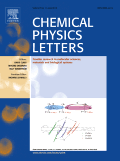
CHEMICAL PHYSICS LETTERS
Your Gateway to Cutting-Edge Research in Physics and ChemistryCHEMICAL PHYSICS LETTERS, published by Elsevier, is a prestigious journal that has been at the forefront of advancing knowledge in the fields of physical and theoretical chemistry and physics since its inception in 1967. With an impressive impact factor reflective of its high-quality research output, this journal holds Q2 quartile rankings in both the Physical and Theoretical Chemistry and Physics and Astronomy categories for 2023. It is recognized as a key platform for disseminating groundbreaking findings, with Scopus rankings placing it within the top 76th and 66th percentiles in its respective categories. Researchers and professionals benefit from its insightful contributions and rigorous peer-review process, making it an essential resource for those engaged in cutting-edge chemical physics studies. Although the journal is not open access, it remains accessible through various institutional subscriptions, ensuring that a wide audience can explore its wealth of knowledge. Located in Amsterdam, Netherlands, the journal continues to drive innovation and collaboration across diverse scientific disciplines.
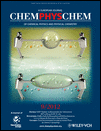
CHEMPHYSCHEM
Delving Deep into the Dynamics of Atomic and Molecular PhenomenaCHEMPHYSCHEM, published by WILEY-V C H VERLAG GMBH in Germany, stands as a pivotal resource for researchers and professionals in the fields of Atomic and Molecular Physics, as well as Physical and Theoretical Chemistry. With a commendable impact across its converged years from 2000 to 2024, the journal is categorized in the second quartile (Q2) for both aforementioned fields according to the 2023 metrics, underscoring its significance in advancing scientific dialogue and research. CHEMPHYSCHEM is committed to disseminating high-quality, peer-reviewed research articles that delve into the intricate interplay between chemistry and physics, making it an essential read for students and experts alike. The journal does not currently offer open access options, allowing for focused scholarly discussions that cater to the academic community's needs. As reflected in its Scopus rankings, CHEMPHYSCHEM maintains respectable standings, ranking #84/224 and #90/189 in its respective categories, demonstrating its commitment to high-impact research and innovation.

Physical Chemistry Research
Fostering collaboration for groundbreaking discoveries in chemistry.Physical Chemistry Research, published by the Iranian Chemical Society, is an esteemed academic journal dedicated to advancing knowledge within the fields of *Fluid Flow and Transfer Processes*, *Physical and Theoretical Chemistry*, and *Statistical and Nonlinear Physics*. Since its inception in 2013, the journal has established a crucial platform for researchers, professionals, and students to share innovative findings and methodologies, enhancing collaboration and knowledge dissemination in the physical chemistry community. With impactful contributions recognized in Quartile 3 and Quartile 4 classifications across various categories, the journal is positioned to cultivate emerging research trends as it continues to converge through 2024. Researchers can benefit from diverse perspectives on crucial phenomena in physical chemistry, as the journal is indexed in prominent databases, further increasing accessibility and visibility. The *open access* policy ensures that cutting-edge research remains available to a broad audience, promoting the growth of the discipline globally.

ACS Physical Chemistry Au
Unlocking the potential of interdisciplinary science.ACS Physical Chemistry Au, published by the American Chemical Society, is a pioneering open-access journal that provides a dynamic platform for researchers and professionals in the field of physical chemistry and its interdisciplinary connections. Since its inception in 2021, the journal has made significant strides in disseminating high-quality research, evidenced by its impressive standings in various categories, including Q1 rankings in Chemistry (miscellaneous), Computational Theory and Mathematics, and Physical and Theoretical Chemistry as of 2023. With a commitment to enhancing the visibility and accessibility of scholarly work, ACS Physical Chemistry Au offers a robust Open Access model, ensuring that groundbreaking research is freely available to a global audience. The journal serves as an essential resource for researchers, students, and practitioners seeking to advance knowledge in computational theory, physical chemistry, and their applied sciences. With an ISSN of N/A and an E-ISSN of 2694-2445, the journal is poised to make a lasting impact in the academic community.
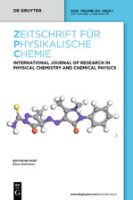
ZEITSCHRIFT FUR PHYSIKALISCHE CHEMIE-INTERNATIONAL JOURNAL OF RESEARCH IN PHYSICAL CHEMISTRY & CHEMICAL PHYSICS
Cultivating Knowledge in Chemical PhysicsZEITSCHRIFT FUR PHYSIKALISCHE CHEMIE-INTERNATIONAL JOURNAL OF RESEARCH IN PHYSICAL CHEMISTRY & CHEMICAL PHYSICS, published by WALTER DE GRUYTER GMBH, is a highly regarded platform for researchers in the field of physical chemistry and chemical physics. With an ISSN of 0942-9352 and an E-ISSN of 2196-7156, this journal serves as a vital resource for the dissemination of original research, critical reviews, and insightful discussions that span theoretical and experimental investigations. Recognized for its quality, it holds a Q2 classification within the 2023 quartiles of Physical and Theoretical Chemistry and ranks 72nd out of 189 in the Scopus database, placing it in the 62nd percentile. The journal’s extensive publication history, originating from 1943, showcases its long-standing commitment to advancing the understanding of complex chemical phenomena. Although it currently does not offer open-access options, it continues to attract contributions from leading experts worldwide, making it essential reading for professionals, researchers, and students dedicated to pushing the frontiers of chemical science. The journal is located in Berlin, Germany, at Genthiner Strasse 13, D-10785 Berlin, Germany.

Chemical Physics Reviews
Connecting Theory and Experiment in Chemical ScienceChemical Physics Reviews is a premier academic journal published by AIP Publishing, focusing on the dynamic interplay between chemistry and physics. With its E-ISSN: 2688-4070, the journal is committed to advancing the field through high-quality reviews that address key challenges, emerging trends, and innovative applications in chemical physics. Although currently not open access, it offers valuable insights for both researchers and practitioners seeking to deepen their understanding of theoretical and experimental aspects of chemical interactions. The journal serves as a vital resource for professionals and students alike, ensuring they stay abreast of the latest developments in this interdisciplinary field. As a part of AIP Publishing’s esteemed catalogue, Chemical Physics Reviews plays an essential role in shaping the discourse and fostering collaboration within the global scientific community.